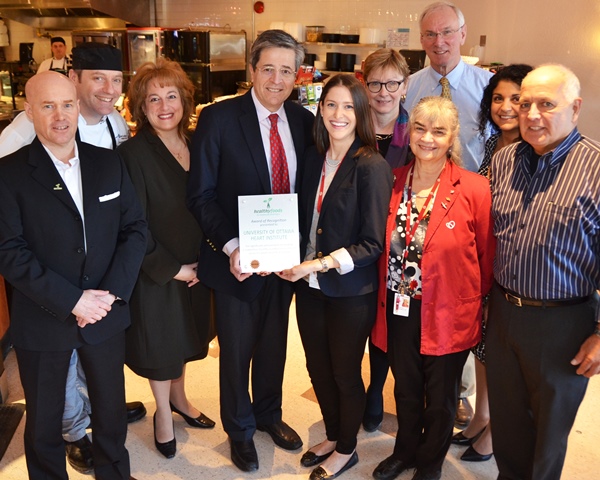By Vincent Lamontagne
Roasted sweet potatoes. Home-made hummus. Grilled veggie wraps. Soups made from scratch. It’s what you might expect on the menu of a downtown bistro. Yet, thanks to the leadership of the Ottawa Heart Institute (UOHI) and the generosity of its Patient Alumni Association, it’s exactly the kind of healthy, delicious food that staff, visitors and patients are now finding at the Institute’s Tickers cafeteria.
Thanks to a $25,000 contribution from the Ottawa Heart Institute’s Patient Alumni Association, the Institute was able to upgrade its equipment in 2015 so that it is easier to prepare healthy food for the 500 or so staff and visitors who eat there every day.
MORE: TOP EMERGING HEALTH TECHNOLOGIES
Jean Bilodeau is the President of the Patient Alumni Association and was among the main instigators, along with hospital officials, of the transformation. “It really fits into our mandate for patient comfort and support. We kept telling patients to go back home and eat right, so we felt we could also help the Heart Institute in its efforts to promote healthy food.”
The motivation to make these changes came out of a larger campaign led by the Champlain Cardiovascular Disease Prevention Network (CCPN), which is housed by and powered at the UOHI. The Healthy Foods in Hospitals Program aims to offer more nutritious food in cafeterias, vending machines, gift shops, and franchises in all 20 hospitals throughout Eastern Ontario. All hospitals are actively participating in the program and making great progress. UOHI was among the first hospitals to sign on.
“The deep fryer has been eliminated and we’ve increased the sizes of our ovens,” said Thomas Riding, the Head Chef of Tickers cafeteria, managed by Marek Hospitality. “Instead of doing French fries, we take the same quantity of potatoes, cut them in wedges, brush them with olive oil and herbs, and cook them in the oven.”
Each day there is also at least one vegetarian soup on offer, as well as protein-rich vegetarian options at the salad bar such as chick peas and beans. Regular potato chips have been replaced with snacks such as trail mix and seed and nut bars. Meanwhile, the size of soft drinks and juice has been reduced and the healthier choices such as bottled water are placed front and centre.
MORE:PROVINCES SHOULD WORK TOGETHER ON NEW FUNDING MODELS
While Riding is enthusiastic about the transformation, he is well aware of the challenges of making changes too quickly. “It’s a fine line between giving people healthier options, without having them become resentful,” Riding explains.
Thanks to Riding’s culinary skills, there’s little chance of that. All soups and entrees are made from scratch, including a selection of healthy take-home meals for customers. “We also make our own muffin batter,” he adds. “So we have more control over ingredients and can add in things like whole wheat flour, real cranberries, lemon zest, diced oranges and walnuts.”
Committed to integrating local food options where possible, Riding is working with local partners to offer some of their healthy products to the Heart Institute clientele.
Riding also tells the heartwarming story of another local food supplier who, in this case, approached them. “The owner of Sushi Box in Orleans was so impressed with the care his mother received while she was a patient at the Heart Institute that he wanted to give back. So he asked us to sell their sushi and donate all the sales to the Institute’s Foundation. Every day he brings in 25 or so fresh items, including wakame (edible seaweed) and octopus salad.”
The Healthy Foods in Hospitals Program is based around three progressive levels of change – Bronze, Silver and Gold. Tickers and the UOHI achieved Bronze in December 2015 and are well on their way to fulfilling the Silver-level requirements.
According to Bilodeau, “Everyone agrees that what we are doing at Tickers is a good thing. I think it shows real leadership, not only on the part of the Institute and the Patient Alumni Association, but also on the part of Marek Hospitality. We know how important prevention is.”
Vincent Lamontagne is Director, Corporate Communications at the University of Ottawa Heart Institute.




